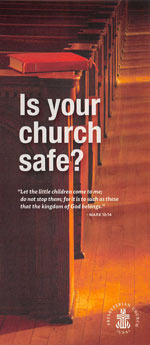God intends for the church and its ministries to be a safe place for all encounter God and grow into lives of service and fulfillment. We are called to be a holy community.
As the one who called you is holy, be holy yourselves in all your conduct.(1 Peter 1:15)
This website is designed to help all ministries be safe ministries.
- create policies
- awareness of prevention practices
- report misconduct
- rebuild a broken trust when sexual misconduct occurs
With God’s help, we will see a day when “justice rolls down like waters, and righteousness like an ever-flowing stream” (Amos 5:24).
Stated Clerk urges Presbyterian churches to enforce sexual misconduct policies
OFFICE OF THE GENERAL ASSEMBLY
THE REVEREND DR. J. HERBERT NELSON, II
STATED CLERK OF THE GENERAL ASSEMBLY
January 9, 2020
Friends and colleagues in Christ:
The Presbyterian Church (U.S.A.) has spoken out against sexual abuse and misconduct for decades. The 205th General Assembly (1993) approved the Sexual Misconduct Policy and its Procedures, and the 219th General Assembly (2010) updated it. As the policy states:
Sexual misconduct takes advantage of the vulnerability of persons who are less powerful to act for their own welfare, including children. It is antithetical to the gospel call to work as God’s servant in the struggle to bring wholeness to a broken world. It violates the mandate to protect the vulnerable from harm.
As of 2011, the Book of Order required all councils to implement a sexual misconduct policy (G- 3.0106). The 222nd General Assembly (2016) approved the Child/Youth/Vulnerable Adult Protection Policy and Its Procedures, and as of 2017 the Book of Order requires all councils to implement a child and youth protection policy (G-3.0106).
While we as a denomination have talked about providing a safe space for individuals to live, work, and play while carrying out the mission of God in Christ, our sexual misconduct policies have not always been effective in protecting vulnerable persons among us. Tragically, the Presbyterian Church (U.S.A.) has sometimes failed to listen to the long-silenced voices of survivors of sexual misconduct by church leaders.
We must do better—as individuals and as a church.
I write to remind you of our obligations as followers of Jesus Christ, and to admonish you to keep the prevention of sexual abuse and the protection of the vulnerable a priority in your mission and service to God, your councils, and the people of God. If your council has not implemented a sexual misconduct policy or a child and youth protection policy—or if you have such policies but have not updated them—make them a priority in the coming year. Train staff, your council leaders, and all who supervise and care for minors on your policies and best practices to protect children and other vulnerable persons.
For guidance and assistance in drafting or revising policies, there are a number of resources available:
- Contact your synod and presbytery offices and ask to review a copy of their sexual misconduct and child and youth protection policies to determine if they can be adapted for use by your council.
- The Creating Safe Ministries page can be found by scrolling down on the pcusa.org homepage. It includes resources such as the General Assembly’s anti-sexual abuse and misconduct policies, guidance on creating policies, prevention, and how to make a report of misconduct or abuse.
- Review the workbench from the Insurance Board, available to all PCUSA councils.
- Victims of sexual misconduct or abuse can call 866-607-7233 to make a report concerning abuse by anyone who is in any way affiliated with the PC(USA). This Helpline was set up by the Office of the General Assembly with its partners the Insurance Board and Praesidium. Councils can also call the Helpline for resources.
The 223rd General Assembly (2018) “encourage[d] mid councils, while respecting confidentiality, to voluntarily submit the number of sexual misconduct allegations and charges within their bounds to the Stated Clerk to be reported to each General Assembly.” Presbytery stated clerks will see this question on the year-end report from now on, and I ask them to respond with this important information.
All of God’s children are precious—but some, such as minors, are more vulnerable. Our church should take all steps possible to prevent sexual abuse and misconduct, and to send a message to those who would prey upon victims that the PC(USA) is watching and determined to protect those they would seek to victimize. We must also listen to the voices of survivors, to learn from grave mistakes of the past in order to avoid them in the future.
In the Faith that we share,

The Reverend Dr. J. Herbert Nelson, II
Stated Clerk of the General Assembly
Presbyterian Church (U.S.A.)
 Download
Download
“Is your church safe?”
brochure
Or write to:
100 Witherspoon Street
Louisville, KY 40202
The National Sex Offender Public Website—coordinated by the Department of Justice—enables anyone to search the latest information for the identity and location of known sex offenders.
The Los Angeles Times shared a database in 2012 containing information on about 5,000 individuals who were expelled from the Boy Scouts of America between 1947 and January 2005 on suspicion of sexual abuse. Click here to access.
